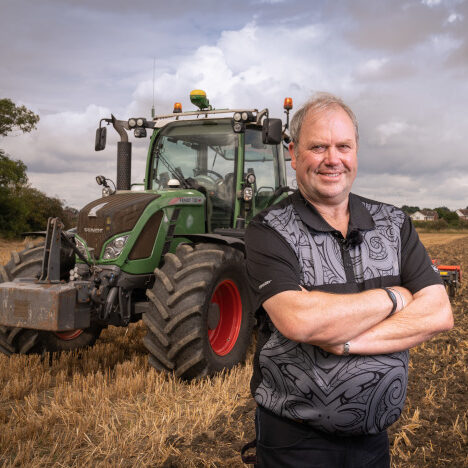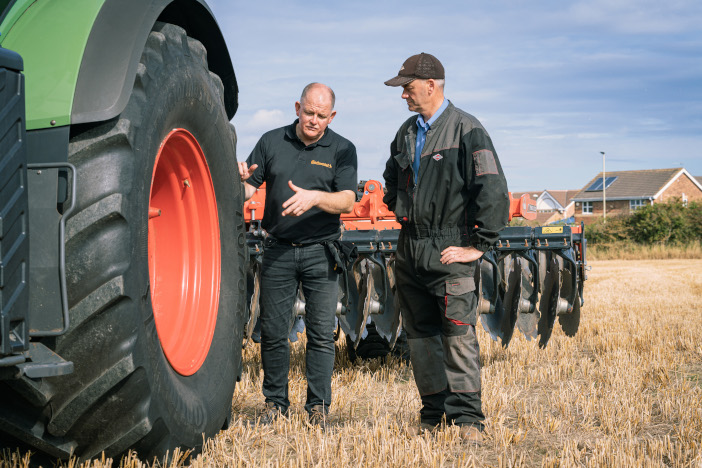Continental has launched a new awareness-raising campaign to help reduce soil compaction in the UK. ‘Stamp out soil compaction’ focuses on the effect of agricultural machinery on soil health. The campaign illustrates how choosing the correct tyres and tyre pressures can reduce compaction, which Continental has demonstrated through a series of on-farm tests.
To demonstrate the effect of tyres set at incorrect pressures for cultivation work, Continental partnered with Kuhn Farm Machinery. Using a Fendt 720 fitted with Continental TractorMaster tyres and pulling a Kuhn Optimer XL 5000, the manufacturers conducted a test with former British ploughing champion, Peter Alderslade.
“We wanted to show that by choosing the correct tyre pressures, operators can reduce soil compaction and improve operational efficiencies. Peter has a wealth of experience as a farmer, contractor and competitor and was the perfect operator for this test,” explained Continental’s agricultural tyre specialist, Richard Hutchins.
Marcus Ainley, Kuhn’s cultivation equipment specialist, suggested that the Optimer cultivator should be run at a forward speed of 10 km/h. “The Optimer XL 5000 is a deep stubble cultivator that required a significant draft response from the tractor. Horsepower is only one consideration when pulling a machine of this type. A tractor like the Fendt with 200hp is at the lower end of what would be expected, but with the tractor and cultivator set up correctly it was able to perform well.”
To achieve this, the tyre pressures for the tractor needed to be set correctly for the load of both the tractor and the cultivator. “Pressure for load should always be accurately calculated to optimise the running of both the tractor and the implement. The Optimer is almost five tonnes, so it is crucial that this was compensated for when the tractor was set up,” Mr Ainley explained.
In the first test, the tyres on the Fendt were set to 30 psi to demonstrate how the increase in wheel slip affected both the tractor and the cultivator. At this pressure, slip was measured at over 30%. “This caused the tractor to over rev which reduces fuel efficiency. It also led to the cultivator moving to one side of the tractor and ‘crabbing’ down the field. At this tyre pressure the tractor could not reach the correct forward speed to pull the Optimer correctly and in doing so was digging into the soil and causing soil compaction,” said Mr Ainley.
To establish the correct tyre pressures Mr Hutchins used the Agriculture TireTech app which holds data for the full range of Continental tyres. By adding the weight of the implement and the size of the tyres, the app calculated the optimum pressures to be 9 psi for the rear and 12 for the front.

“Running at this pressure had immediate benefits. The slip was reduced to below 10% and the tractor was able to achieve the required forward speed without putting undue stress on the engine. It also demonstrated that soil compaction could be significantly decreased when pulling the Optimer cultivator,” said Mr Hutchins.
The weight of farm vehicles, and the tyre pressures chosen, are major contributors to soil compaction. Mr Hutchins suggested that increased axle weights, caused by heavy implements and more powerful machines, can be offset by tyres that can spread this weight. “Damage to topsoil is caused by incorrect tyre inflation, whilst compaction in the subsoil is largely caused by increased axle loads. Calculating the correct pressure for the load will minimise the impact farming has on both,” he explained.
In 2020 the TractorMaster tyre delivered the most efficient transmission of engine power, offering the best ratio of tractive output to PTO of the brands in a test carried out by the Deutsche Landwirtschafts-Gesellschaft (The German Agricultural Society, DLG). When set to the same pressure for load, the tyre proved three per cent faster over the same distance and used less fuel to complete the same task.
“These efficiencies are largely due to new technology that Continental has applied to agricultural tyres for the first time,” said Mr Hutchins.
N.flex technology is a patented, heat-treated nylon that sits beneath the rubber of the tyre. It enables the tyre to keep its shape, following heavy or prolonged periods of use, which reduces rolling resistance. The more flexible properties of the TractorMaster tyre enable it to withstand and absorb impacts more effectively and return to its original shape.
Mr Hutchins added: “The roundness of a tyre is a big consideration for soil compaction. If a tyre maintains its round shape throughout its lifetime, it will move more consistently and efficiently over the land which will help to reduce compaction.”

Technological developments in the construction of the TractorMaster bead design have also helped to increase fuel and operational efficiencies. Continental’s research, carried out at a new research and development facility in Lousado, showed a more flexible tyre with a stronger single bead filament construction is safer and allows the tyre to be fitted to the rim with greater ease. “The bead also holds the rim better and transfers torque more efficiently, which also helps to reduce fuel consumption.”
The TractorMaster is also available as a very high flexion (VF) tyre. On the road, this enables the vehicle to carry forty per cent more load than a standard tyre at the same pressure. Alternatively, in the field, the pressure of VF tyres can be lowered by forty per cent compared to standard tyres, even when carrying the same load. This spreads the weight of the vehicle over a larger surface area to reduce soil compaction and improve fuel efficiency.
“VF tyres help to reduce compaction by offering greater load-bearing properties and the ability to run at lower pressures. Continental is advocating the use of VF technology as a more sustainable way to run heavy machinery,” Mr Hutchins said.
Developments in tyre technology provide some of the answers to reducing soil compaction. However, operating at the correct pressures and avoiding using machinery on very soft ground are operator decisions.
“All the technological advancements that have been made since Continental produced the first pneumatic tractor tyre in 1928 are only of use if the operator calculates and uses the correct pressures. This is why we have launched the Agriculture TireTech app and the stamp out soil compaction campaign. Continental and other manufacturers, have spent millions developing tyres, but we want to work with operators to help them make the most of the technology and improve soil health,” Mr Hutchins concluded.

